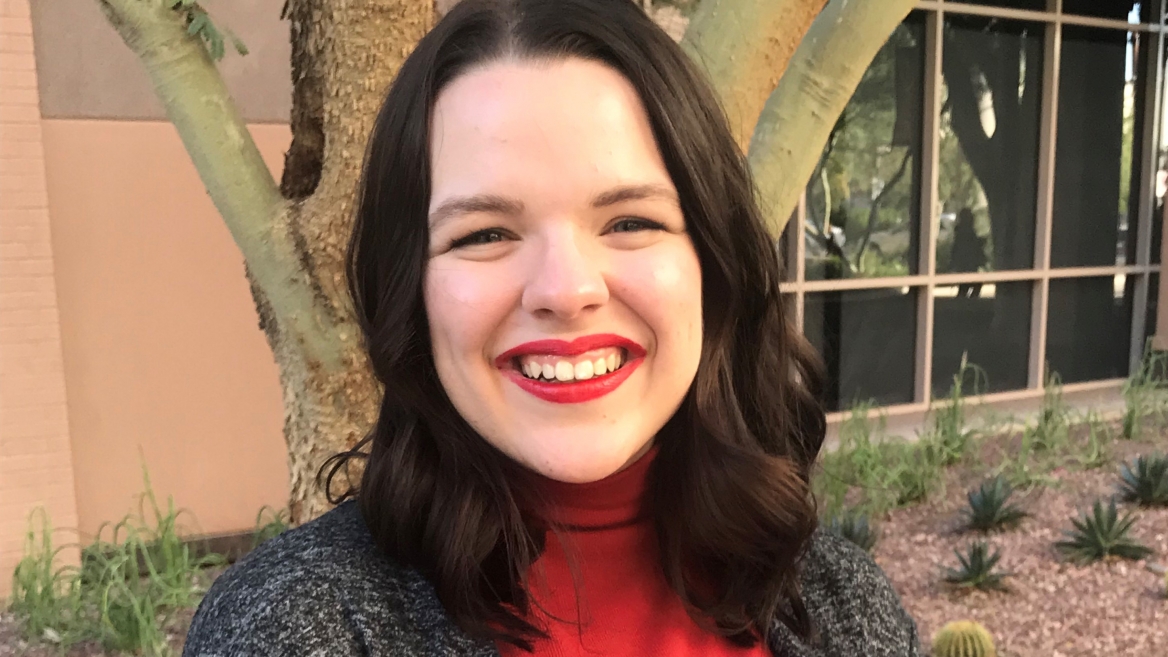
Book that outstanding grad read as a teen led her to seek a criminology career
Editor’s note: This is part of a series of profiles for fall 2019 commencement.
College students often have doubts, and Brittny Dwyer is no different. In fact, she recalls struggling during her junior year with feelings of inadequacy, belying the passion and drive that eventually would earn her the title of 2019 Outstanding Graduate for the School of Criminology and Criminal Justice at Arizona State University.
Dwyer, also a student at Barrett, The Honors College who will receive her bachelor of science degree in criminology and criminal justice, was sitting in a physio-psychology class surrounded by cerebral fortitude.
“I needed the psych credit,” recalled the Gilbert, Arizona, resident. “It was intimidating, sitting in class with biology and neurology majors. I felt so out of place.”
But the instructor, psychology Lecturer Eevin Jennings, taught Dwyer how much she could push herself in her studies.
“She has become such a mentor to me,” Dwyer said. “She was so encouraging and passionate about the material. I remember being in class saying, ‘Yeah, I want to be a professor like her one day.’ Now, I’m a teaching assistant for her.”
By the way, Dwyer said she ended up acing Jennings’ class.
“She helped me realize I want to be a professor. I want to help future generations.”
Dwyer discovered she wanted to study criminal justice when she first read a book, "The Lucifer Effect" by Phillip Zimbardo, which deals with the psychology of what pushes seemingly normal people to do bad things, things that seem outside of their character.
“At the time I was 14 or 15, and in early college enrollment at Chandler-Gilbert Community College,” she said. “I took a criminology and a psychology class on a whim and I fell in love with it. I wanted to do something with my future to help people. I didn’t know what that looked like until I found criminology and criminal justice and completely immersed myself in it.”
“I had to have the drive to discipline myself and work very hard, even at times when I didn’t want to work at all. That was one thing I was not really expecting.”
— Brittny Dwyer
Her experiences at ASU helped her realize something she hadn’t before, she said: That merely being inspired or motivated only takes a person so far.
“In my degree, I had to rely on self-discipline and passion for the subject, especially during my (honors) thesis,” Dwyer said. “I had to have the drive to discipline myself and work very hard, even at times when I didn’t want to work at all. That was one thing I was not really expecting.”
After CGCC, she said she heard ASU had an “amazing” criminal justice program, with criminology and criminal justice doctoral and online graduate programs ranked fifth and sixth, respectively, in the nation by U.S. News & World Report.
She advised social science students how important it is to never stop asking questions and to be unafraid to ask them.
“Sometimes people hold back. I did sometimes in my career at the risk of sounding ignorant or dumb. But the CCJ profs are so encouraging of analytical thinking,” Dwyer said. “Through asking questions, that’s how you make progress in your field. Otherwise we’ll never find any answers to the problems, so you should not be afraid to ask questions.”
Even though the CCJ program is based at the Downtown Phoenix campus, her favorite campus location is the Noble Library on the Tempe campus used by mostly engineering students, whom she said are among the quietest at study.
“It’s a great place to focus. Less noisy than Hayden,” she said with a laugh.
After graduation, she said she plans to finish work on publishing her thesis in a scholarly journal and applying to PhD programs in forensic psychology or clinical psychology.
If she were granted $40 million to solve one of the world’s problems Dwyer said she would use the money to battle sex trafficking, with a big chunk of the funds devoted to shining light on the damage trafficking has done to its victims and to society.
“Better education of the public and stronger intervention policies, internationally (are needed),” Dwyer said. “There are a lot of issues in other countries where certain laws work against themselves, especially in cases of child pornography. It’s worth investing in rehabilitation, not only for victims, but offenders, too.”
“It’s worth trying — compared to doing nothing,” she said.